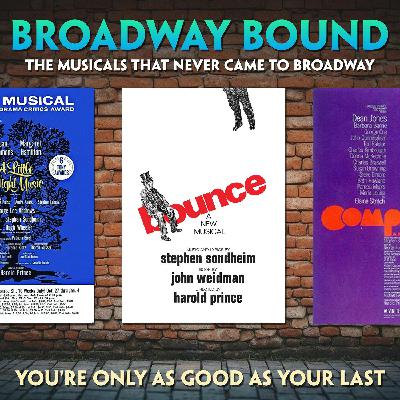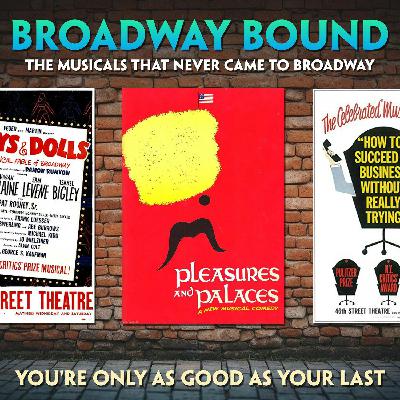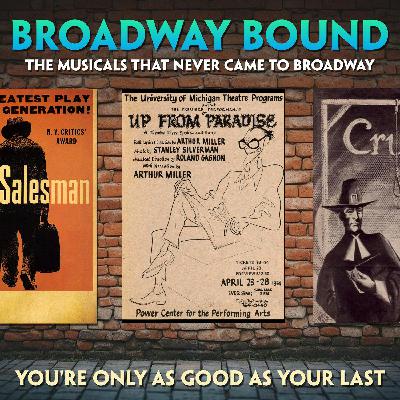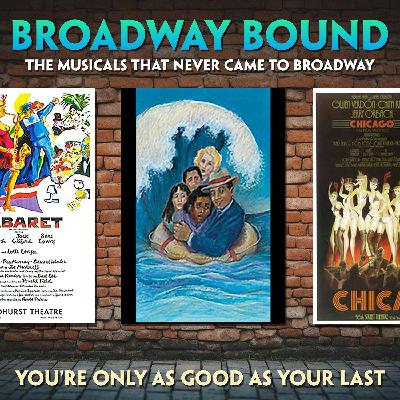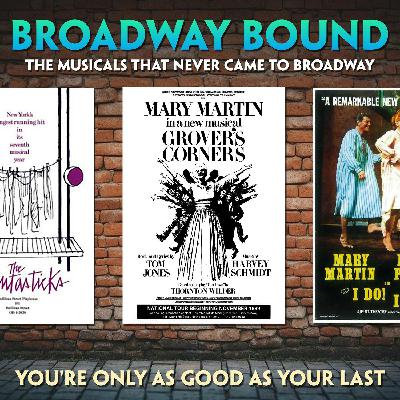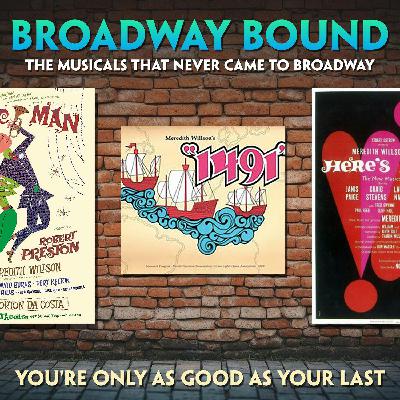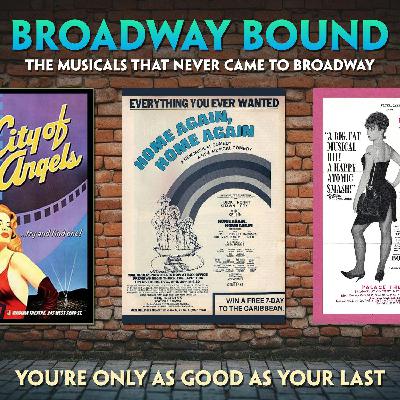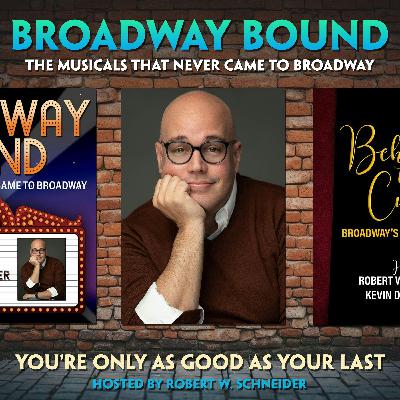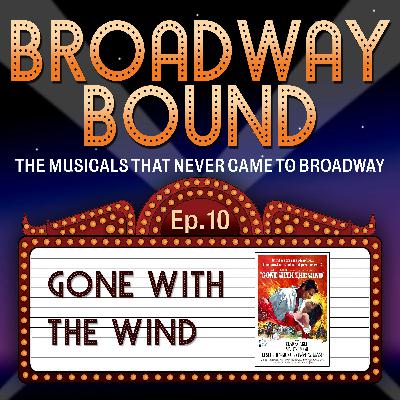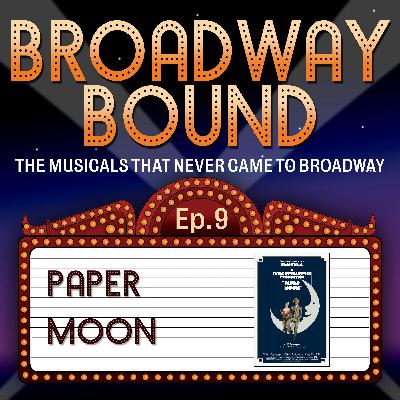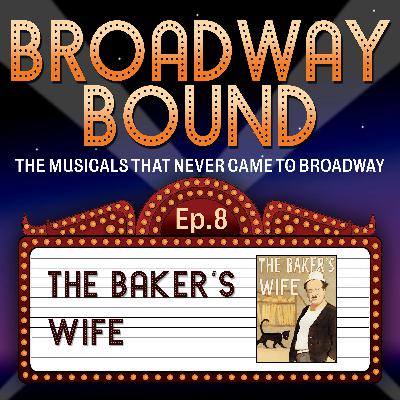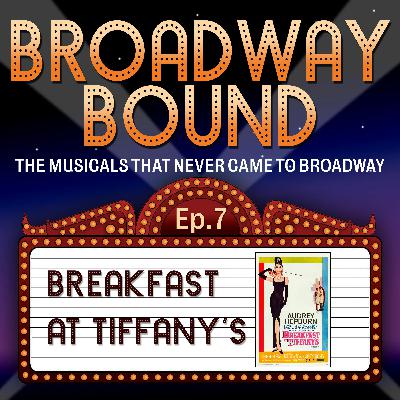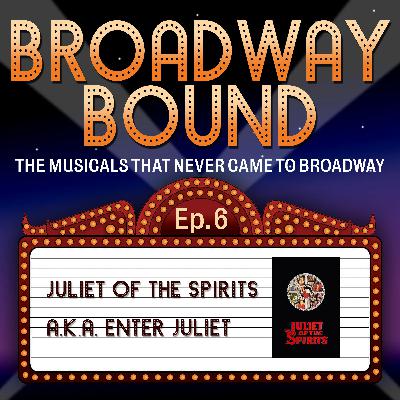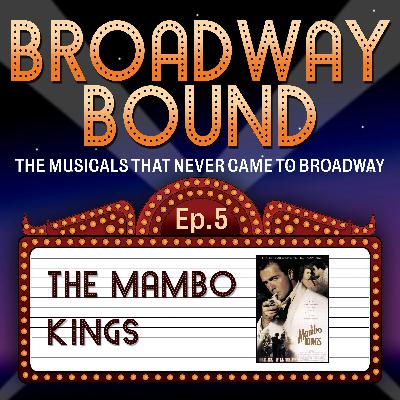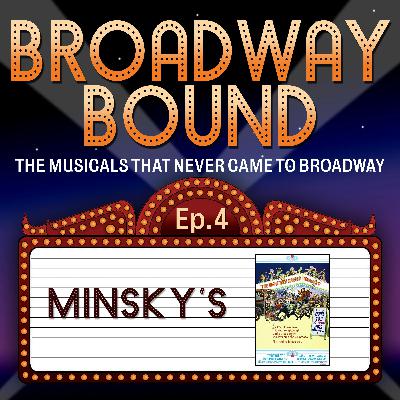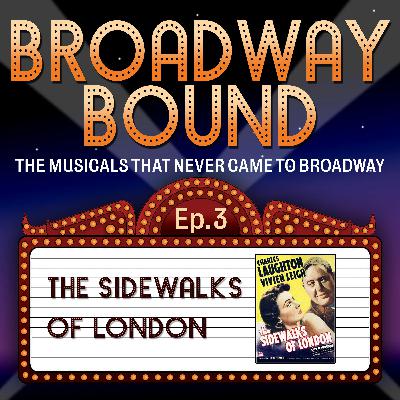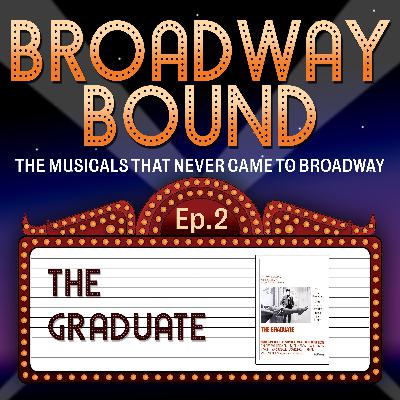Discover Broadway Bound: The Musicals That Never Came to Broadway
Broadway Bound: The Musicals That Never Came to Broadway

Broadway Bound: The Musicals That Never Came to Broadway
Author: Robert W. Scheider & Broadway Podcast Network
Subscribed: 19Played: 372Subscribe
Share
© Broadway Podcast Network
Description
Join Broadway historian, director, and all around MT nerd Robert W. Schneider for a wild and exhaustively researched celebration of the musicals that had set their sights on Broadway but missed the mark. The second season of Broadway Bound is called "YOU'RE ONLY AS GOOD AS YOUR LAST" explores ten Broadway Bound musicals that were written by major songwriters. From a foul mouthed Little Orphan Annie to dancing woolly mammoths, Broadway Bound: The Musicals That Never Came To Broadway is sure to open your eyes to some of the most bizarre, brilliant, and bold musicals that tried to get themselves on the Great Bright Way!
22 Episodes
Reverse
60 Songs
50 Years
9 Leads
5 Directors
4 Scripts
1 Sondheim
We close our second season with the story of Stephen Sondheim's half century quest to bring musical life to the true story of 1920s schemers Addison and Wilson Mizner.
Whether you knew it as A Sentimental Guy, Wise Guys, Gold, Get Rich Quick, Bounce, or Road Show, this episode will give you a glimpse into never before heard communication between some of Broadway's most prolific minds as they all work to bring Sondheim's dream to fruition.
Learn more about your ad choices. Visit megaphone.fm/adchoices
If I said to you I have a score by Guys and Dolls’ Frank Loesser, book by Kiss Me Kate’s Sam Spewack, directed by the one and only Bob Fosse, and starring television personality Phyllis Newman, you’d probably ask where could you invest because this is gonna be bigger than talking pictures!
But, it wasn’t? Why? Why did all of these wonderful people struggle with making Russian expansion funny and musical?
Well…..why is Frank Loesser’s Pleasures and Palaces even worth talking about?
What if I told you it was the show that created the Fosse dancer. See what happened was…..well, you will need to listen to find out!
Learn more about your ad choices. Visit megaphone.fm/adchoices
I never miss an Arthur Miller musical!
Yes, you read that correctly. Arthur Miller, the voice of gritty American realism, whose plays confronted capitalism, communism, and catastrophe one day woke up and decided to be the next Jerry Herman. You see what happened was....
Well, you will need to listen to our episode about UP FROM PARADISE to find out!
Learn more about your ad choices. Visit megaphone.fm/adchoices
What do Leonard Bernstein, James Joyce, woolly mammoths, Bebe Neuwirth, the ice age, and Mario Cantone all have in common? They all tried to succeed by the skin of their teeth in John Kander, Fred Ebb, and Joseph Stein's musical adaptation of Thornton Wilder's meta-theatrical experience titled The Skin of Our Teeth, Thornton Wilder's The Skin of Our Teeth, Over and Over, All About Us.....
Learn more about your ad choices. Visit megaphone.fm/adchoices
In 1960, Tom Jones and Harvey Schmidt created theater
history when their whimsical musical, The Fantasticks, the little show that
no one believed in, opened and would not close until forty years later.
Twenty-seven years later they would say “Smart New York money says we're not what's
happening at the moment. We are perceived as the past. The perspective of us
needs to be altered,” and so they plunged head first into musicalizing the play
that had inspired them to create theater in the first place, Thornton Wilder’s Our
Town. But why, almost forty years later, no one will ever get to hear it?
See what happened was…..well, guess you will need to find out for yourself when we explore how the geniuses behind The Fantasticks struggled against the tides of British imports to bring musical life to Grover’s Corners, with a cast of characters ranging from Gene Kelly to Angela
Lansbury to Peter Pan herself, Mary Martin.
If you like what we are doing DONATE HERE
Fair use is a legal doctrine that promotes freedom of
expression by permitting the unlicensed use of copyright-protected works in
certain circumstances. Section 107 of the Copyright Act of 1976 provides the
statutory framework for determining whether something is a fair use and
identifies certain types of uses—such as criticism, comment, news reporting,
teaching, scholarship, and research—as examples of activities that qualify as
fair use.
Learn more about your ad choices. Visit megaphone.fm/adchoices
It might end up being one the longest partnerships in the history of the American Musical. Betty Comden and Adolph Green, the lyricists of On the Town, Wonderful Town, Bells Are Ringing, Do Re Mi, Applause, On the 20th Century, the screenplay writers of Singing in the Rain, and the duo that
gave the world phrases like “New York, New York, it’s a helluva town!” “Never Never land!” “Make Someone Happy” “The Party’s Over” and so many others.
But, all of that amazing work might not have happened if they had brought their gold rush musical, Bonanza Bound, onto Broadway when they were first starting out!
Grab your sleds and huskies because there is gold in them that hills….and by hills I mean Philadelphia where we will look at 1947’s Bonanza Bound!
Learn more about your ad choices. Visit megaphone.fm/adchoices
Before Lin Manuel Miranda....before Jason Robert Brown....before Jonathan Larson....there was Meredith Willson, the one man band who gave the world its most American of musicals, The Music Man.
But what happens when the music man wants to change his tune? And change it while being confronted with every major life crisis imaginable?
Join Christopher Columbus, Meredith Willson, and Chita Rivera in a madcap adventure through one of the trickiest musicals to sink on its way to Broadway: 1491
Learn more about your ad choices. Visit megaphone.fm/adchoices
Composer Cy Coleman gave Broadway some of its most iconic melodies:
Big Spender, Real Live Girl, Hey, Look Me Over, and the list goes on and on. He
was the King of 60s smooth swing and had never once closed a show out of town….until….
Along with a wild crew including a Pulitzer Prize winning journalist,
a testy choreographer, a director unsure of the material, and a leading man who
was as eccentric offstage as he was on, Cy Coleman tried to bring a bucolic
morality musical to life but Home Again, Home Again shuttered in Canada.
But soon Coleman had an idea for his next musical! A musical
about a musical whose wild crew included a Pulitzer Prize winning journalist, a
testy choreographer, a director unsure of the material, and a leading man who
was as eccentric offstage as he was on, as they all careened to opening on the
great bright way.
See what happened was…well, you will just need to jump into
our episode focusing on Baker’s Dozen/Home Again/Home Again Home Again/10 Days
to Broadway/13 Days to Broadway…..yes….there are more titles.
If you like what we are doing DONATE HERE
Fair use is a legal doctrine that promotes freedom of
expression by permitting the unlicensed use of copyright-protected works in
certain circumstances. Section 107 of the Copyright Act of 1976 provides the
statutory framework for determining whether something is a fair use and
identifies certain types of uses—such as criticism, comment, news reporting,
teaching, scholarship, and research—as examples of activities that qualify as
fair use.
Learn more about your ad choices. Visit megaphone.fm/adchoices
Trigger Warning: This episode deals with pedophilia
If there was source material that no one ever thought could
be a musical, you would go to one man to write it. Not Lin Manuel Miranda. Not
Stephen Sondheim. Not even Oscar Hammerstein. You would go to lyricist Alan Jay
Lerner who, along with Frederick Loewe, created Brigadoon, Camelot, and the
juggernaut known as My Fair Lady.
But when Loewe chooses to retire, and Broadway moves to pop,
Alan Jay Lerner has two options. He can either retire himself OR try to outdo
the current crop of edgy young songwriters who are putting sex, drugs, rock and
roll onstage. Could Lerner top them all with the adding songs to the most scandalous
book ever written?
See what happened was….well, you will need to find out for yourself
when we see what happened when Alan Jay Lerner tried to get audiences excited
about turning Vladimir Nabokov’s Lolita, a book centered on the adoration of
nymphets, into a big old musical called Lolita, My Love!
If you like what we are doing DONATE HERE
Fair use is a legal doctrine that promotes freedom of expression by permitting the unlicensed use of copyright-protected works in certain circumstances. Section 107 of the Copyright Act of 1976 provides the statutory framework for determining whether something is a fair use and
identifies certain types of uses—such as criticism, comment, news reporting, teaching, scholarship, and research—as examples of activities that qualify as fair use.
Learn more about your ad choices. Visit megaphone.fm/adchoices
In 1977, Martin Charnin, Charles Strouse, and Thomas Meehan,
looked at one another on the opening night of Annie and said five magic words
to one another “This show will run forever!”
Thirteen years later, Charnin, Strouse, and Meehan looked at
one another on the opening night of Annie 2 and said another five words to one
another “We wrote the wrong show.”
See what happened was…..well, guess you will need to find
out for yourself when we explore how the geniuses behind Annie 1
struggled to find the right elements to make Annie 2 just as brilliant as
her older sister.
If you like what we are doing DONATE HERE
FAIR USE:
Fair use is a legal doctrine that promotes freedom of
expression by permitting the unlicensed use of copyright-protected works in
certain circumstances. Section 107 of the Copyright Act of 1976 provides the
statutory framework for determining whether something is a fair use and
identifies certain types of uses—such as criticism, comment, news reporting,
teaching, scholarship, and research—as examples of activities that qualify as
fair use.
Learn more about your ad choices. Visit megaphone.fm/adchoices
Join Broadway historian, director, and all around MT nerd Robert W. Schneider for a wild and exhaustively researched celebration of the musicals that had set their sights on Broadway but missed the mark. This trailer looks at the second season of Broadway Bound which is called "YOU'RE ONLY AS GOOD AS YOUR LAST" and explores ten Broadway Bound musicals that were written by major songwriters. From a foul mouthed Little Orphan Annie to dancing woolly mammoths, Broadway Bound: The Musicals That Never Came To Broadway podcast is sure to open your eyes to some of the most bizarre, brilliant, and bold musicals that tried to get themselves on the Great Bright Way!
Learn more about your ad choices. Visit megaphone.fm/adchoices
When we think of "out of town" tryouts we think of Boston, New Haven, Philadelphia, Detroit, Tokyo…..
Yes, Tokyo!
In the 1970s Tokyo had become the center of Japanese culture and it was giving its citizens home grown movies, literature, plays, and paintings but it had not given its public a musical that was cultivated in Japan. So what better option than an hour adaptation of Gone With The Wind?
Well, what happened was…..well were gonna let Miss Scarlett herself, Lesley Ann Warren, tell you in this week’s episode of which explores Gone With the Wind: The Musical! Well, fiddle- dee- dee!
BROADWAY BOUND PLAYERS
Ray Hebel as Joe Layton
Cameron Kalajian as Akira Takarada
CJ Schneider as Harold Rome
Molly Stillens as Florence Rome
Jake Urban as Rex Reed
If you like what we are doing DONATE HERE
Fair use is a legal doctrine that promotes freedom of expression by permitting the unlicensed use of copyright-protected works in certain circumstances. Section 107 of the Copyright Act of 1976 provides the statutory framework for determining whether something is a fair use and identifies certain types of uses—such as criticism, comment, news reporting, teaching, scholarship, and research—as examples of activities that qualify as fair use.
Learn more about your ad choices. Visit megaphone.fm/adchoices
This one is a heart-breaker, friends.
A real, honest to Sondheim heart-breaker.
Like Avenue Q beating Wicked heart-breaker because, unless without a deus ex machina at Paramount Studios, we will never, ever see a musical that everyone says was one of the greatest musicals of the 1990s.
Starring Christine Ebersole, Gregory Harrison, and......wait, why should I tell you when book writer Martin Casella and ensemble members John Bolton and Christopher Sieber can as they back on 1993's Paper Moon.
BROADWAY BOUND PLAYERS
Charles Kirsch as The New York Times Critic
Matt Koplik as The New York Times Reporter
CJ Schneider as Larry Grossman
If you like what we are doing DONATE HERE
Fair use is a legal doctrine that promotes freedom of expression by permitting the unlicensed use of copyright-protected works in certain circumstances. Section 107 of the Copyright Act of 1976 provides the statutory framework for determining whether something is a fair use and identifies certain types of uses—such as criticism, comment, news reporting, teaching, scholarship, and research—as examples of activities that qualify as fair use.
Learn more about your ad choices. Visit megaphone.fm/adchoices
What do a nine minute song about a bird, the chest hair of Israel's greatest entertainer, an FBI pursuit of a missing lead sheet, and a list of firings as long as Paul Sorvino's range have in common? They were all part of the madcap, wild, manic, and tumultuous ride of Stephen Schwartz and Joseph Stein's The Baker's Wife.
Get ready as original cast members Carole Demas, Kurt Peterson, Teri Ralston, as well as original press agent Joshua Ellis, look back on Topol, Patti LuPone, David Merrick, and a meadowlark longing to break free.
BROADWAY BOUND PLAYERS
Nicole Weitzman as Patti LuPone
Cole Winston as Stephen Schwartz
If you like what we are doing DONATE HERE
Fair use is a legal doctrine that promotes freedom of expression by permitting the unlicensed use of copyright-protected works in certain circumstances. Section 107 of the Copyright Act of 1976 provides the statutory framework for determining whether something is a fair use and identifies certain types of uses—such as criticism, comment, news reporting, teaching, scholarship, and research—as examples of activities that qualify as fair use.
Learn more about your ad choices. Visit megaphone.fm/adchoices
What happens when the doctor becomes the patient?
Abe Burrows, the greatest script doctor of the Golden Age, had agreed to direct and write the musical adaptation of Breakfast at Tiffany's. Only problem is no one told him what they wanted...or expected...
Soon, it was a troubled musical with different titles, different book-writers (including Edward Albee), America's cutest TV stars floundering without cameras, the Abominable Showman himself, David Merrick, and.....well, why have us tell you when ten time Emmy Award winning director James Burrows (Cheers, Friends) looks back on his father's work and his own experience as the assistant stage manager of Holly Golightly/Breakfast At Tiffany's: The Musical
BROADWAY BOUND PLAYERS
Caleb Funk as Edward Albee
Andrew Leggieri as Jeff
Alaina Mills as Holly
Brody Redman as Abe's friend
CJ Schneider as New York Times critic
Jake Urban as Angel, Policeman, and Howard
Cole Winston as Stage Directions
If you like what we are doing DONATE HERE
Fair use is a legal doctrine that promotes freedom of expression by permitting the unlicensed use of copyright-protected works in certain circumstances. Section 107 of the Copyright Act of 1976 provides the statutory framework for determining whether something is a fair use and identifies certain types of uses—such as criticism, comment, news reporting, teaching, scholarship, and research—as examples of activities that qualify as fair use.
Learn more about your ad choices. Visit megaphone.fm/adchoices
Gwen Verdon was Charity. Raul Julia was Guido. Angela Lansbury was Juliet......then was not.
Federico Fellini was Italy’s most iconic film director of the 1960s so its no surprise that many of his films have been turned into musicals. But, there is a Fellini movie that screams to be a musical, even more so than any of the others and it almost was…with Angela Lansbury in the title role….grab a pizza, open some chianti, and get ready to hear all about the greatest musical that never was: Enter Juliet!
BROADWAY BOUND PLAYERS
Aaron Gooden as Lucien
Ray Hebel as Ely Jacques Kahn
Brian Michael Henry as George
Laura Mason as Carolyn Leigh
CJ Schneider as Morton DaCosta
Daniel Schwartzberg as Larry Adler
Nicole Weitzman as Juliet
Cole Winston as Stage Directions
If you like what we are doing DONATE HERE
Fair use is a legal doctrine that promotes freedom of expression by permitting the unlicensed use of copyright-protected works in certain circumstances. Section 107 of the Copyright Act of 1976 provides the statutory framework for determining whether something is a fair use and identifies certain types of uses—such as criticism, comment, news reporting, teaching, scholarship, and research—as examples of activities that qualify as fair use.
Learn more about your ad choices. Visit megaphone.fm/adchoices
It was supposed to be the musical that turned Latinx characters in musical theater from hoodlums and gang members to heroes and inspirations! A musical that was steeped in the rhythms of Latinx history and a story that would examine assimilation and appropriation within the immigration experience. So why was creator Arne Glimcher leaving his heart, and show, in San Francisco? Well you see what happened was…..well, we are going to let composer Carlos Frazetti tell us in this episode of Broadway Bound which will focus on the 2005 heart-breaker The Mambo Kings!
BROADWAY BOUND PLAYERS
Bryan Austermann as The Variety Reporter
Erin Fagundes as The San Jose Mercury News Reporter
Andres Felipe as Oscar Hijuelos and Sergio Trujillo
Jordan Ari Gross as The San Francisco Chronicle Reporter
Daniel Schwartzberg as Michael Riedel
Sean Stephens as The Oakland Tribune Reporter
Antonio Urrutia as Jaime Camil
Nicole Weitzman as The San Francisco Examiner Reporter
If you like what we are doing DONATE HERE
Fair use is a legal doctrine that promotes freedom of expression by permitting the unlicensed use of copyright-protected works in certain circumstances. Section 107 of the Copyright Act of 1976 provides the statutory framework for determining whether something is a fair use and identifies certain types of uses—such as criticism, comment, news reporting, teaching, scholarship, and research—as examples of activities that qualify as fair use.
Learn more about your ad choices. Visit megaphone.fm/adchoices
Some musicals have all the luck...and them some do not. Minsky's is one that does not.
It would take thirty plus years for this cult classic to make its way from the big screen to the big stage and in between it would have three different lyricists, two different directors, two choreographers, but it would always have the same composer: Charles Strouse. Why was he so determined to get this movie to Broadway?
Well, what happened was....We are going to let two time Tony Award winning director Casey Nicholaw give you an insider's look at what should've been the next Drowsy Chaperone: Minsky's!
BROADWAY BOUND PLAYERS
Matthew Fairlee as Morton Minsky
Cole Winston as Bob Boyett
Brian Michael Henry as Charles Strouse
Caleb Funk as Kevin McCollum
Michael McDonald as The New York Times Critic
Matt Koplik as The Variety Critic
If you like what we are doing DONATE HERE
Fair use is a legal doctrine that promotes freedom of expression by permitting the unlicensed use of copyright-protected works in certain circumstances. Section 107 of the Copyright Act of 1976 provides the statutory framework for determining whether something is a fair use and identifies certain types of uses—such as criticism, comment, news reporting, teaching, scholarship, and research—as examples of activities that qualify as fair use.
Learn more about your ad choices. Visit megaphone.fm/adchoices
Tommy Tune. The boy genius of Broadway. He dazzled audiences onstage in his Tony Award winning performance in Seesaw. Then he kept reinventing himself as a director with The Club, The Best Little Whorehouse in Texas, Cloud Nine, Nine, Grand Hotel, The Will Rogers Follies.
Nothing could stop him except…..well, we’re gonna let producer Barry Weissler tell you in this week’s episode which explores the bone fracturing Busker Alley…I mean Stage Door Charley…I mean Buskers….I mean… Busker Alley?
BROADWAY BOUND PLAYERS
Sabrina Brush as Liz Smith
James Cella as Ken Madelbaum
Michael McDonald as Robert Feldberg
Robbie Rozelle as Michael Riedel
Andy Tighe as AJ Crothers
If you like what we are doing DONATE HERE
Fair use is a legal doctrine that promotes freedom of expression by permitting the unlicensed use of copyright-protected works in certain circumstances. Section 107 of the Copyright Act of 1976 provides the statutory framework for determining whether something is a fair use and identifies certain types of uses—such as criticism, comment, news reporting, teaching, scholarship, and research—as examples of activities that qualify as fair use.
Learn more about your ad choices. Visit megaphone.fm/adchoices
Are you trying to musicalize me, Mrs. Robinson? Oh, yes, Benjamin Braddock, they are trying to musicalize you, and Mrs. Robinson, and Elaine, all of you. They are going to keep going until every critic in New York is banging on a church window begging you to stop.
And who is giving you these songs to sing, Mrs. Robinson? Simon and Garfunkel? Nope. Not at all. Sharing a xylophone (yes, a xylophone) were the man who wrote Funny Girl and the man who wrote Bat Out of Hell.
What happened was… well we will tell you in this week’s episode of BROADWAY BOUND: THE MUSICALS THAT NEVER GOT TO BROADWAY which explores The Graduate: The Musical, or “I Want to Say One Word To You. Just One Word: Don’t”
BROADWAY BOUND PLAYERS
Catherine DeLuce as New York Times Reporter
Matthew Fairlee as Milton Greene
Matt Koplik as Bob Greene
Rebecca Spigelman as Glady Nederlander
If you like what we are doing DONATE HERE
Fair use is a legal doctrine that promotes freedom of expression by permitting the unlicensed use of copyright-protected works in certain circumstances. Section 107 of the Copyright Act of 1976 provides the statutory framework for determining whether something is a fair use and identifies certain types of uses—such as criticism, comment, news reporting, teaching, scholarship, and research—as examples of activities that qualify as fair use.
Learn more about your ad choices. Visit megaphone.fm/adchoices


